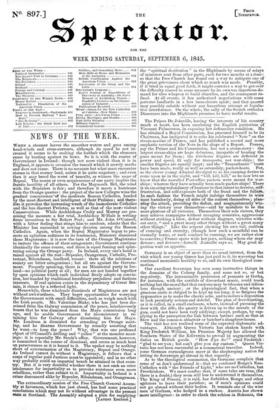NEWS OF THE WEEK.
WHEN a steamer leaves the smoother waters and goes among head-winds and cross-currents, although its speed be not in- creased it seems to be making the hubbub which the elements cause by beating against its bows. So it is with the course of Government in Ireland : though not more violent than it is in England, it appears to occasion the tumult which it merely marks and does not cause. There is no measure but what must encounter storms in that stormy land, unless it be quite nugatory ; and even then it may breed the worst of tumults, as witness the nugee of Repeal. The assent or even acquiescence of one party implies the frantic hostility of all others. For the Maynooth Bill, the wind with the Repealers is fair - and therefore it meets a hurricane from the Orange quarter : fair; of the new Colleges wins the gradual concurrenceof the moderate Roman Catholics, headed by the most discreet and intelligent of their Prelates an'd there- fore it provokes the increasing wrath of the immoderate Catholics and the less discreet Prelates, as well as that of the mora violent Conservatives. While Archbishops Crony and Murray are pro- mising the measure a fair trial, Archbishop M‘Hale is writing fierce invectives to Sir Robert Peel ; and Mr. John O'Connell, with a bitter feeling that stings him to candour, admits that the Minister has succeeded in sowing division among the Roman Catholics. Again, when the Repeal Magistrates began to pro- mote an agitation seditious in its tendencies, Ministers dismissed those Magistrates : it is now the turn of the Orange Magistrates to imitate the offence of their antagonists ; Government continue identically the same course, and there is equal fuming and splut- tering among the Orange party. In Ireland, every one's hand is raised against all the rest—Repealer, Orangeman' Catholic, Pro- testant, Ribandman, landlord, tenant : there all the relations of society are bitter antagonisms ; but all are against the Govern- ment. Properly speaking, there is no Ministerial party in Ire- land—no political party at all for men are not banded together by open opinions which each individual freely adopts on convic- tion, but banded by traditional hereditary prejudices and factious interests. If real opinion exists in the dependency of Great Bri- tain, it shines by a reflected light. Meanwhile, these wholesale dismissals of Magistrates are not without awkwardness. They beget opportunities for worrying the Government with small difficulties, such as weigh much with the Irish people. Mr. Valentine Blake, who has just been dis- missed from the Galway commission of the peace, mischievously boasts that he was dismissed from the Mayo commission long ago, and he scolds Government for inconsistency in re- taining him for Galway after dismissing him for Mayo. Mr. Lendrum is dismissed for attending an Orange meet.- ing, and he disarms Government by roundly asserting that he went—to keep the peace Why, that was one professed object of O'Connell's drilling and " police" at the monster meet- ings: it is especially Mr. Steele's office. Government, however, is committed to the course of dismissal, and seems as much bent on perseverance as it is bound to it. The upshot may be nothing short of extermination of the Magistracy, Repeal and Orange. As Ireland cannot do without a Magistracy, it follows that a corps of regular paid Justices must be appointed ; and in no other way probably is an impartial bench be attained in that coun- try. But it s very doubtful whether there is not such an utter intolerance for impartiality as to provoke resistance even more rebellious, rather than submit to it. Impartiality in Ireland is a crime denounced alike by Repealer, Ribandman, and Orangeman.


























